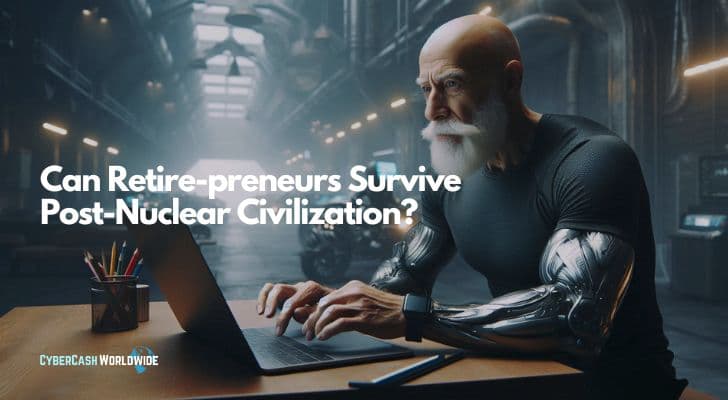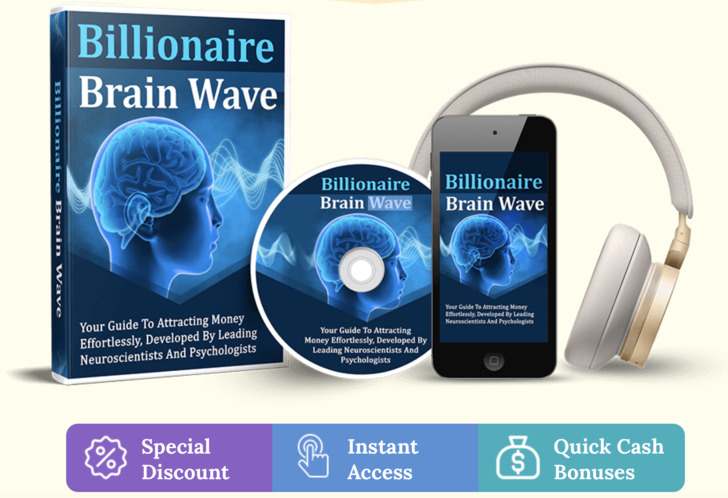Nuclear war represents humanity's ultimate stress test, yet the demographic most likely to survive such catastrophe isn't the young, strong, or militarily trained - it's the retire-preneurs. The silver-haired entrepreneurs possess a paradoxical combination of wealth, wisdom, and flexibility that transforms them into post-apocalyptic powerhouses.
The decades of business acumen, coupled with established networks and accumulated resources, create survival advantages that younger generations simply cannot match. Could the very group society considers most vulnerable actually hold the keys to humanity's continuation?

Wealth Accumulation Creates Survival Buffers
Retire-preneurs possess financial resources that younger entrepreneurs only dream of having. The lifetime of business ventures, property investments, and retirement savings creates multiple layers of protection against nuclear fallout's economic devastation. Traditional disaster preparedness focuses on immediate survival needs, but retire-preneurs think in terms of sustainable reconstruction over decades. The approach to survival transcends mere subsistence and enters the realm of civilization rebuilding.
Global Real Estate Portfolios
Real estate portfolios spread across multiple continents give retire-preneurs options when nuclear targets eliminate entire regions. A 67-year-old former tech executive owns properties in New Zealand, rural Montana, and the Swiss Alps, each equipped with independent power sources. Nuclear strategists target major population centers, leaving the remote holdings largely untouched.
The geographical diversification means while others fight over contaminated urban ruins, retire-preneurs relocate to pristine backup locations. Properties in neutral countries provide immediate shelter and established infrastructure that others must build from scratch. The investment portfolios that once generated rental income now serve as ready-made survival compounds.
Alternative Currency Holdings
Precious metals and cryptocurrency holdings remain valuable when traditional currencies collapse post-nuclear exchange. Retire-preneurs who converted portions of wealth into gold, silver, and digital assets maintain purchasing power when paper money becomes worthless. The alternative currencies retain value because they exist outside government control systems that nuclear war destroys.
Smart retire-preneurs already have established relationships with dealers who accept the alternative payment forms. The precious metals can be traded directly for goods and services when banks fail completely. Cryptocurrency wallets, stored offline in secure locations, provide access to digital wealth that survives electromagnetic pulses.
Strategic Industry Investments
Private equity investments in survival-related industries position retire-preneurs as post-war economic leaders. Those who invested in water purification companies, renewable energy firms, and agricultural technology find themselves controlling post-nuclear necessities. The investments pay dividends when society rebuilds, making retire-preneurs the new power brokers.
The ownership stakes in reconstruction-critical industries translate into political influence and resource control. Water treatment facilities become more valuable than gold mines when radiation contaminates natural water sources. Agricultural technology companies that produce radiation-resistant crops become essential for food security.
International Banking Relationships
Established credit relationships with international banks survive nuclear conflicts better than domestic financial institutions. Retire-preneurs who maintained accounts with Swiss, Singaporean, or other neutral nation banks retain access to capital when domestic banks fail. The international connections prove invaluable when rebuilding requires importing resources from unaffected regions.
The credit histories with foreign institutions open doors that remain closed to others. Banking relationships in non-targeted countries provide access to international markets and trade opportunities. The established trust and financial history with foreign banks enable rapid access to reconstruction capital.

Survival Alliances
Business Networks Become Survival Alliances
The professional networks retire-preneurs built over decades transform into powerful survival coalitions when nuclear war strikes. The contacts span industries, countries, and social strata, creating resource-sharing opportunities unavailable to isolated individuals. Relationships forged through years of mutual profit prove more durable than family ties under extreme stress. Business partnerships that weathered economic downturns easily adapt to post-nuclear reconstruction challenges.
Competitor Cooperation
Former competitors become essential allies when market dynamics shift from profit-seeking to survival-focused cooperation. Two retire-preneurs who previously competed in the pharmaceutical industry now combine manufacturing knowledge and supplier contacts to produce essential medicines. The competitive history actually strengthens the alliance because they understand each other's capabilities and limitations.
The mutual respect accelerates decision-making and resource allocation during crisis periods. Previous business rivalries transform into complementary skill sets that cover more ground than individual efforts. The former competitors now share resources, facilities, and expertise to maximize survival outcomes for both parties.
International Supply Networks
International trade relationships morph into post-nuclear supply chains that bypass destroyed infrastructure. A retired import-export entrepreneur uses existing connections with South American suppliers to establish new trade routes through unaffected ports. The relationships, built on decades of successful transactions, survive nuclear disruption because they exist outside targeted zones.
The entrepreneur's reputation for fair dealing ensures preferential treatment when resources become scarce. Long-term partnerships with international suppliers provide access to goods unavailable through domestic channels. The established shipping routes and customs relationships enable rapid movement of essential supplies.
Corporate Governance Positions
Board memberships and advisory roles convert into post-war governance positions within surviving corporate structures. Retire-preneurs who served on multiple company boards find themselves naturally positioned to lead post-nuclear economic reconstruction efforts. The governance experience and established relationships with other board members create instant leadership structures.
The positions grant access to surviving corporate resources and decision-making authority over reconstruction priorities. Board meeting networks become crisis management teams with existing communication channels and decision-making protocols. The leadership experience translates directly into coordinating large-scale reconstruction projects.
Professional Association Networks
Professional associations and industry groups become mutual aid societies with practical survival benefits. Members of the International Entrepreneurs' Organization who prepared together for potential disasters now share resources and coordinate survival strategies. The pre-existing communication channels and trust relationships accelerate aid distribution and problem-solving.
The group's diverse skill sets complement each other, creating comprehensive survival capabilities. Professional networks that once focused on business development now coordinate emergency response and resource sharing. The association members provide mutual support and specialized expertise that individual families cannot match.

Retire-preneurs Technology Mastery
Technology Mastery Provides Strategic Advantages
Retire-preneurs who built businesses during the digital revolution possess technological knowledge that becomes critically relevant after nuclear conflict. The experience with emerging technologies during entrepreneurial careers gives them intuitive understanding of which systems survive electromagnetic pulses and which fail. Unlike digital natives who grew up with user-friendly interfaces, retire-preneurs understand the underlying mechanics of technology systems. The deeper knowledge allows them to repair, modify, and repurpose technology when professional support disappears.
Ham Radio Communications
Ham radio expertise, gained during pre-internet business years, becomes the primary post-nuclear communication method. Retire-preneurs who maintained amateur radio licenses for emergency business communications suddenly find themselves controlling the only functioning long-distance communication networks. The knowledge of radio propagation, antenna design, and frequency management makes them information brokers in a disconnected world.
The skills were common among entrepreneurs who built businesses before cellular networks existed. Amateur radio operators can establish communication networks that span continents when satellite and cellular systems fail. The technical knowledge allows them to repair and modify radio equipment using basic electronic components.
Renewable Energy Systems
Solar panel and battery system installations, originally purchased for cost savings, now power essential post-nuclear operations. Forward-thinking retire-preneurs who invested in renewable energy systems during business careers find themselves with functioning electricity when the grid fails. The systems, designed for energy independence rather than mere backup power, generate enough electricity to operate workshops and processing facilities.
The installations become the foundation for rebuilding industrial capabilities. Solar arrays that once reduced utility bills now provide the only reliable electricity in the region. Battery storage systems that were luxury items become essential for maintaining power during cloudy periods and nighttime hours.
Satellite Communications
Satellite internet systems, acquired for remote business operations, maintain global connectivity when terrestrial networks collapse. Retire-preneurs who used satellite communications for rural or international business operations retain internet access post-nuclear conflict. The familiarity with satellite systems allows them to maintain websites, coordinate with distant partners, and access critical information.
The connectivity advantage makes them invaluable coordinators for reconstruction efforts. Satellite communication terminals become command centers for organizing regional recovery efforts. The ability to access global information networks provides strategic advantages in planning and coordination.
Manufacturing Equipment
3D printing and CNC machining equipment, purchased for prototyping business ventures, produces essential replacement parts. Retire-preneurs who invested in manufacturing technology for startups now use the machines to create unavailable components for survival equipment. The experience with computer-aided design and manufacturing processes allows them to reverse-engineer and produce critical items.
The capabilities make them indispensable to any surviving group. Manufacturing equipment that once produced business prototypes now creates essential tools and replacement parts. The technical knowledge enables them to train others in manufacturing processes and expand production capabilities.
Geographic Mobility Enables Strategic Positioning
The geographic flexibility that allowed retire-preneurs to pursue business opportunities worldwide becomes a crucial survival advantage during nuclear conflict. The passport collections, visa histories, and international property holdings create escape routes unavailable to location-bound individuals. Years of international business travel familiarized them with alternative transportation methods, border crossings, and safe havens. The mobility mindset - viewing the entire world as potential opportunity space - translates directly into survival advantage.
Multiple Citizenship Options
Multiple citizenship arrangements, obtained for business tax advantages, now provide legal sanctuary in non-targeted nations. Retire-preneurs who acquired second passports through investment programs or ancestral claims find themselves with legal rights to residence in nuclear-free zones. The dual citizenship status allows them to cross borders legally when others become refugees without rights.
The arrangements, originally motivated by tax planning, become lifelines during international crisis. Multiple passports provide options for relocation to stable countries with functioning governments and infrastructure. The legal status in multiple countries ensures access to social services and protection under international law.
Private Aviation Assets
Private aircraft ownership or fractional jet shares enable rapid evacuation from targeted areas before nuclear strikes occur. Wealthy retire-preneurs who maintained aviation assets for business convenience now use them to escape danger zones within hours of threat identification. The flight experience and aircraft knowledge allow them to operate independently of commercial aviation systems that shut down during crises.
Pilot licenses and aircraft maintenance knowledge become survival skills rather than luxury conveniences. Private aircraft provide mobility when commercial flights are cancelled and roads become impassable. The ability to fly to remote locations opens survival options unavailable to ground-bound individuals.
International Property Holdings
International real estate holdings in neutral countries provide immediate shelter options away from nuclear conflict zones. Retire-preneurs who purchased vacation homes or investment properties in Switzerland, Costa Rica, or New Zealand find themselves with furnished refuges in stable nations. The properties, complete with local utility connections and neighborhood relationships, offer immediate integration into functioning societies.
The international property management experience helps them maintain assets in ready condition. Foreign real estate investments that once generated rental income now serve as fully-equipped survival retreats. The established local relationships and knowledge of foreign communities facilitate rapid integration and acceptance.
Global Logistics Networks
Established relationships with international moving and logistics companies facilitate rapid relocation of essential assets. Retire-preneurs who used global shipping services for businesses now employ the same companies to relocate survival supplies and equipment to safe locations. The knowledge of customs procedures, shipping routes, and logistics providers accelerates the movement of critical resources.
The relationships, built through years of business dealings, provide priority service during emergency situations. International shipping contacts enable rapid movement of supplies to safe locations before conflict escalates. The logistics expertise helps coordinate supply chains that span multiple countries and transportation methods.

Medical Preparedness Through Private Healthcare
Retire-preneurs' access to premium healthcare and medical professionals creates significant survival advantages during post-nuclear medical crises. The relationships with concierge doctors, specialists, and private medical facilities translate into continued healthcare access when public systems collapse. Years of managing age-related health issues taught them to build redundant medical support systems. The healthcare independence becomes crucial when nuclear fallout creates medical emergencies while destroying hospital infrastructure.
Concierge Medical Services
Concierge medicine relationships ensure access to medical professionals who make house calls during post-nuclear healthcare system collapse. Wealthy retire-preneurs who pay annual fees for premium medical access maintain doctor relationships that survive infrastructure destruction. The physicians, already committed to serving a limited patient base, continue providing care when hospital systems fail.
The personalized attention and established relationships mean medical needs receive priority treatment even during crisis conditions. Concierge doctors often maintain private medical supplies and equipment that remain available when hospitals are overwhelmed. The direct-pay relationships with physicians bypass insurance systems that collapse during nuclear emergencies.
Medication Stockpiles
Private medication stockpiles, accumulated through international prescriptions and medical tourism, last longer than public pharmacy supplies. Health-conscious retire-preneurs who obtained prescription medications from multiple countries and sources maintain larger reserves than typical patients. The experience with international healthcare systems allowed them to build redundant medication supplies legally.
The stockpiles become invaluable when nuclear disruption eliminates normal pharmaceutical distribution channels. International prescription purchases that once saved money now provide essential medications when domestic supplies are exhausted. The knowledge of international pharmacy systems enables continued access to medications through foreign suppliers.
Home Medical Equipment
Medical equipment investments, made for aging-related health management, become critical post-nuclear diagnostic and treatment capabilities. Retire-preneurs who purchased home medical devices like oxygen concentrators, blood pressure monitors, and diagnostic equipment now possess functioning medical capabilities. The familiarity with operating equipment allows them to provide medical services to others.
The devices, maintained with backup power systems, function when hospital equipment fails. Home medical equipment that once provided convenience now delivers essential healthcare services to entire communities. The technical knowledge enables them to train others in medical equipment operation and maintenance.
Alternative Medicine Knowledge
Alternative medicine knowledge, gained through health optimization pursuits, provides treatment options when conventional medicine becomes unavailable. Retire-preneurs who explored acupuncture, herbal medicine, and other alternative treatments during health-conscious years now possess valuable medical knowledge. The understanding of traditional healing methods supplements limited conventional medical resources.
The diverse medical knowledge proves especially valuable when pharmaceutical supplies become exhausted. Alternative medicine expertise that once supplemented conventional healthcare now becomes primary treatment methodology. The knowledge of herbal remedies and traditional healing provides medical options when modern pharmaceuticals are unavailable.
Food Production and Distribution Networks

The agricultural investments and rural property holdings common among successful retire-preneurs create food security that urban populations cannot match. The experience with farming, either as investments or hobbies, provides practical knowledge of food production systems. Business backgrounds in logistics and distribution translate directly into food supply chain management during scarcity periods. The capabilities become essential when nuclear fallout disrupts conventional agriculture and food distribution systems.
Agricultural Land Assets
Agricultural land ownership with established irrigation and farming infrastructure enables immediate food production when supply chains collapse. Retire-preneurs who invested in farmland as part of diversified portfolios now control food production capabilities. The properties, complete with wells, irrigation systems, and storage facilities, produce food independently of disrupted supply networks.
Management experience from running agricultural investments translates into practical farming knowledge during crisis periods. Farmland that once generated passive income now provides active food production capabilities. The established infrastructure and equipment reduce the time needed to begin large-scale food production.
Seed Collection Resources
Seed banks and heritage variety collections, maintained as gardening hobbies, become the foundation for post-nuclear crop production. Retire-preneurs who collected heirloom seeds and rare plant varieties now possess genetic resources for reestablishing agriculture. The seed collections, stored in proper conditions with backup power systems, survive nuclear disruption better than commercial seed supplies.
Knowledge gained through gardening hobbies becomes professional agricultural expertise during reconstruction. Seed collections that once supported hobby gardening now provide genetic diversity for rebuilding agricultural systems. The heritage varieties often possess natural resistance to environmental stresses that become crucial after nuclear contamination.
Food Processing Capabilities
Food preservation and processing equipment, installed for self-sufficiency projects, maintains nutrition when fresh food becomes unavailable. Retire-preneurs who invested in freeze-drying equipment, canning systems, and food processing machinery now control critical food preservation capabilities. The experience with operating equipment allows them to process and preserve food for extended storage periods.
The capabilities become essential services for communities attempting to survive extended periods without fresh food supplies. Food processing equipment that once preserved garden harvests now handles community-scale food preservation needs. The technical knowledge enables them to train others in food preservation methods and expand processing capabilities.
Distribution Management Systems
Distribution networks, established through rural property management, coordinate food sharing among survival groups. Retire-preneurs who managed multiple rural properties developed transportation and logistics systems that now distribute food resources efficiently. The knowledge of rural road networks, storage facilities, and coordination systems enables food distribution to scattered populations.
The management skills prevent food spoilage and ensure equitable distribution among survival communities. Distribution systems that once managed agricultural products now coordinate community food sharing programs. The logistics expertise helps establish trade networks between different survival groups and agricultural areas.
Energy Independence Through Infrastructure Investments
The renewable energy systems and backup power installations that retire-preneurs installed for business continuity become lifelines during post-nuclear power grid failures. The experience with energy independence projects, originally motivated by cost savings and environmental concerns, creates functioning power systems when centralized generation fails. Knowledge gained through managing installations allows them to maintain, repair, and expand power generation capabilities. The energy independence becomes the foundation for rebuilding industrial civilization.
Solar Power Systems
Solar panel arrays with battery storage systems, scaled for complete energy independence, continue operating when centralized power grids fail completely. Retire-preneurs who installed comprehensive solar systems for properties now control reliable electricity generation independent of nuclear-damaged infrastructure. The systems, designed for complete energy autonomy rather than mere backup power, generate enough electricity to operate workshops and community facilities.
Experience with maintaining systems allows them to keep power flowing when technical support disappears. Solar installations that once reduced utility bills now provide the only reliable electricity in entire regions. The battery storage systems enable continuous power availability even during extended cloudy periods.
Full HD Webcam with Built-in Microphone and Rotatable Tripod
Full HD Video and Wide Angle Lens - The Tewiky High Definition 1080p Webcam features a wide angle lens and delivers crisp clear images and fluid video at 30 frames per second while gaming, video calling, online teaching, live streaming, or recording.
We earn a commission if you click this link and make a purchase at no additional cost to you.
Backup Generator Networks
Backup generator systems with substantial fuel reserves provide reliable power during extended grid outages following nuclear attacks. Wealthy retire-preneurs who installed whole-house generators with large propane or diesel reserves maintain power capabilities for months after nuclear strikes. The generator systems, professionally installed with automatic transfer switches, provide seamless power continuation without manual intervention.
Fuel storage facilities, built to commercial standards, contain enough reserves to operate for extended periods. Generator systems that once provided emergency backup now serve as primary power sources for entire communities. The automatic operation and large fuel reserves ensure continuous power without constant maintenance or refueling.
Wind Energy Integration
Wind power installations on rural properties supplement solar generation and provide power during winter months when solar output declines. Forward-thinking retire-preneurs who combined wind and solar systems create comprehensive renewable energy capabilities independent of seasonal variations. The hybrid systems, with proper battery storage and power management, maintain consistent electricity generation throughout the year.
Experience with managing multiple energy sources provides the technical knowledge needed to optimize power production. Wind turbines that once supplemented solar panels now provide essential power during periods of low solar generation. The combination of wind and solar systems creates more reliable power generation than either technology alone.
Hydro Power Resources
Micro-hydro systems on properties with water features generate continuous power without fuel requirements or maintenance intensive equipment. Retire-preneurs who installed water-powered generators on streams and creeks possess the most reliable form of renewable energy. The systems, once properly installed, generate electricity continuously without fuel costs or complex maintenance requirements.
The experience with water rights and environmental regulations helps them maximize hydro generation while maintaining system reliability. Hydro systems that once provided supplemental power now deliver consistent electricity generation regardless of weather conditions. The continuous power generation provides baseline electricity that supports other renewable energy systems.
The retire-preneur advantage in nuclear survival scenarios stems not from physical strength or youth, but from decades of accumulated resources, relationships, and knowledge. The business experience created practical skills that translate directly into post-apocalyptic leadership capabilities. While younger generations focus on immediate survival, retire-preneurs think systematically about long-term reconstruction and sustainable recovery. Perhaps the ultimate irony of nuclear war is that those society considers most vulnerable become the architects of humanity's renewal - proving that wisdom and resources trump youth and strength when civilization faces its greatest test.
How I "Finally" Make Over $7,000 Monthly Income
"The most valuable thing I've ever done!"


